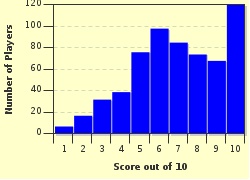Quiz Answer Key and Fun Facts
1. The first modern day Olympic games were held in Athens in 1896. Host country Greece won 10 of the 43 silver medals which were then awarded to the winners. Probably the most famous of the Greek winners was Spiridon Louis. Which event did he win?
2. Over the years, some events were added to the Olympics, and others were removed. One event that is not held any longer was dominated by the American Ray Ewry, who won 3 consecutive gold medals in 1900, 1904 and 1908 (as well as the intercalalated games of 1906 in Athens). Which event was this?
3. At the 1908 London Olympics, the first marathon runner to cross the finish line was Italian Dorando Pietri. However, he did not win because of a disqualification. What was the reason for this disqualification?
4. Paavo Nurmi was one of the so-called 'Flying Finns'. In the 1924 Paris Olympics he gained 5 gold medals, in 1920 and 1928 another 4 gold and 3 silver ones. He also wanted to compete in the 1932 Olympics, but was unable to do so. Why?
5. American athlete Jesse Owens won 4 gold medals on the 1936 Berlin Olympics, at 100 meters, 200 meters, long jump and 4x100 meters relay. However, he nearly missed the finals of the long jump, because his first two jumps had been declared fouls. He was saved when someone advised him to jump some distance before the official takeoff spot, so that his jump would definitely be valid, and because of his qualities enough to qualify for the last three jumps. Who gave this advice to Jesse Owens?
6. The star of the 1952 Olympics was Czech runner Emil ZŠtopek, who won the 5000 meters, 10,000 meters, and marathon. He was married to Dana IngrovŠ, who at the same Olympics also won a gold medal. At which event did she do this?
7. In Rome in 1960, the marathon is won by the Ethiopian Abebe Bikila. Apart from being an unofficial world record, what is remarkable about this race?
8. In Mexico City in 1968, the height of Mexico City meant that conditions were very favorable for sprinters, and the person that took the most advantage of this was Bob Beamon, who made a long jump that remained the world record for 23 years. What distance did he jump?
9. Nadia Com„neci was only 14 years old when the 1976 Montreal Olympics were held, but she became one of the stars of the Games, gaining 3 gold medals at the uneven bars, the balance beam, and the all around gymnastics title. Apart from her young age, what is remarkable about her Olympic participation and titles that year?
10. In Beijing in 2008, Michael Phelps gained 8 gold medals, setting a record for most won gold medals in a single Olympic Game. The old record (7 gold medals) was also held by a swimmer. Who was it?
Source: Author
engels
This quiz was reviewed by FunTrivia editor
Nightmare before going online.
Any errors found in FunTrivia content are routinely corrected through our feedback system.

